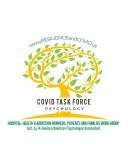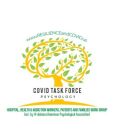Coronavirus Disease 2019
The Psychology Behind COVID-19 Vaccine Hesitancy
How to approach challenging conversations about vaccines.
Posted September 17, 2021 Reviewed by Devon Frye
Key points
- Vaccine hesitancy poses a serious public health crisis.
- Vaccine hesitancy is not unique to COVID-19.
- Psychological theories on heuristics and cognitive biases can help explain vaccination hesitancy.
- Understanding the motivational factors and “mental traps” behind the hesitancy is critical to foster respectful and productive conversations.
This post was written by Klarissa Garcia, Psy.D., and Robert M. Gordon, Psy.D., an Affiliate Member and Member, respectively, of the Medical and Addictions working group of the COVID-19 Psychology Task Force (est. by 14 divisions of the American Psychological Association), which sponsors this blog.
Vaccines save lives. However, a sizeable percentage of the population is reluctant to get the COVID-19 vaccine.
Vaccine hesitancy is a major public health crisis, with complex psychological underpinnings. It is not unique to COVID-19. In fact, the World Health Organization (2019) named vaccine hesitancy as one of the ten threats to global health even before this pandemic.
According to a May 2021 report by the International Monetary Fund, COVID-19 vaccine hesitancy ranged from 10 to 20 percent in the UK, about 45 percent in the U.S., and 60 percent in France. Reasons for low vaccination rates typically involve concerns about efficacy and unforeseeable side effects, often fueled by misinformation and/or lack of trust in government and medical systems.
Persuading the Vaccine-Hesitant
Promoting COVID-19 vaccination is a critical goal. However, conversations regarding the vaccine can at times turn hostile. It is common for people who are hesitant to be categorized as “anti-vaxxers,” when the situation is much more complex.
In fact, a large percentage of people who are reluctant to get the COVID-19 vaccine are supportive of vaccines overall, yet are skeptical of this vaccine in particular (Doheny, 2020). They should not be confused with “anti-vaxxers” whose presence appears bigger than it is given how vocal they are. Psychologists who study medical decision-making processes explain that these choices involve multiple interacting factors and that many individuals are simply undecided.
In order to promote respectful conversations about vaccine hesitancy, it is helpful to understand the motivations, emotions, and values involved. The following psychological theories and research can be useful in “turning down the temperature” of these challenging conversations.
The "Five Cs" of Vaccine Hesitancy
Psychologist Cornelia Betsch and colleagues created a scale called the 5C’s, which illustrates five factors that contribute to vaccine hesitancy.
- Confidence in the Safety of Vaccines: Research shows that the main reason for COVID-19 vaccination hesitancy is a fear of unforeseeable secondary effects.
- Complacency: How people perceive their own risk of contracting the disease. Individuals may argue that since they have not contracted COVID-19 up until this point, the risk of catching the virus is not that high.
- Constraints: How easy or difficult it is for people to be vaccinated (e.g., accessibility, childcare, time off from work), which varies for different groups.
- Calculation: People’s engagement in searching for information to weigh the pros and cons. Although there are multiple valid sources of information, there is a lot of misinformation out there. An individual’s cost/benefit analysis will depend on which sources they rely upon.
- Collective Responsibility: Willingness to protect others through one’s own vaccination. Some individuals have been vaccinated despite being hesitant due to an altruistic sense of social responsibility. In contrast, others claim they would rather not be vaccinated, and be protected by those around them who are.
The five Cs have been shown to explain most of the variability among an individual’s decision to get the COVID-19 vaccine. However, other reasons exist, such as previous negative experiences with vaccines, fear of needles, and elevated fear of vaccination interacting with existing medical conditions. In addition, there is an understandable mistrust that certain communities of color have in the medical system given their past history with racist practices (e.g., the Tuskegee syphilis study, 1932-1972).
The Role Heuristics Play in Vaccine Hesitancy
Why are individuals reluctant to take the COVID-19 vaccine if experts and research have rigorously shown its safety and effectiveness in saving lives? This is where psychological theories and research on heuristics and cognitive biases can explain vaccination hesitancy.
- Affect Heuristics: Emotions of narratives can cloud objectivity. Narratives with a strong emotional component about vaccination are often found on social media containing personal information of unknown validity. This potentially unreliable information stays with the readers and overpowers the scientific, accurate facts when deciding to be vaccinated against COVID-19.
- Availability Heuristic: Tendency to rely on examples that come to mind quickly when evaluating danger, which contributes to the overappraisal of base-rate risk. For example, individuals may overestimate their risk of so-called “breakthrough infections” after a COVID-19 vaccination based on isolated media reports (Leonhardt, 2021). Likewise, people may overestimate the risk of blood clots after getting the Johnson & Johnson vaccine, although it is significantly lower than the risk of blood clots from other medications they may be taking (e.g., birth control).
- Omission Bias: Tendency to prefer harm due to omission (inaction) over commission (taking action) despite differences in the probability of harm. Some people are willing to accept significantly worse outcomes from contracting COVID-19 compared to tolerating the side effects of the vaccine.
- Confirmation Bias: Tendency for initial views to be strong and highly resistant to change. Although COVID-19 hesitancy has decreased by a third from January to May 2021 (King et al., 2021), some individuals are sticking to their initial views despite the enormous amount of information regarding vaccination safety and recent FDA approval.
- Dunning-Kruger Effect: The tendency for individuals who lack expertise to inaccurately appraise their own knowledge compared to that of experts. For example, Callaghan et al. (2018) found in a study about the myth of “vaccines causing autism” that participants who had less knowledge about the causes of autism endorsed the myth and believed that they knew more than the scientists.
Implications for Conversations about Vaccine Hesitancy
- How does your decision impact your loved ones/community?
- What side effects are you concerned about? Where did you get that information?
- How scientifically-based is the information you received?
- How would you assess the potential risks of vaccination’s side effects compared to contracting COVID-19?
- What values did you consider in making your decision?
- What emotions were present, and how did they impact your decision?”
- Looking ahead five years into the future, how do you think you will view your decision?
- In the case of mistrust of government agencies or “big pharma,” where does this sense of mistrust come from? Have you had specific experiences?
Although getting vaccinated against COVID-19 is an easy decision for many, it is a complex one for others. Understanding the motivational factors and “mental traps” behind the hesitation is critical as it may foster productive conversations to enable us to achieve higher rates of vaccination.
Klarissa Garcia, Psy.D., completed her doctorate in Clinical Psychology at the University of Denver and her predoctoral internship at NYU Rusk Rehabilitation. She is currently a postdoctoral fellow completing autism and psychological evaluations. Her interests include traumatic brain injury (TBI), obsessive-compulsive disorder (OCD), and perinatal mental health. Robert M. Gordon, Psy.D., is the Director of Intern Training at Rusk Rehabilitation and Clinical Associate Professor at NYU Grossman School of Medicine. He is a member of the Medical and Addictions workgroup (established by 14 divisions of the American Psychological Association) that sponsor this blog.
References
Betsch, C., Schmid, P., Heinemeier, D., Korn, L., Holtmann, C., & Böhm, R. (2018). Beyond confidence: Development of a measure assessing the 5C psychological antecedents of vaccination. PLos ONE, 13(12): e0208601. https://doi.org/10.1371/journal.pone.0208601
Dabla-Norris, E., Khan, H., Lima, F., & Sollaci, A. (2021, May). Who doesn’t want to be vaccinated? Determinants of vaccine hesitancy During COVID-19. International Monetary Fund. https://www.imf.org/en/Publications/WP/Issues/2021/05/06/Who-Doesnt-Wan…
Doheny, K. (2021). COVID Vaccine hesitancy: 90 million still on the fence. WebMD. https://www.webmd.com/vaccines/covid-19-vaccine/news/20210810/covid-vac…
Freeman, D., Lambe, S., Yu, L., Freeman, J., Chadwick, A., Vaccari, C., . . . Loe, B. (2021). Injection fears and COVID-19 vaccine hesitancy. Psychological Medicine, 1-11. http://doi.10.1017/S0033291721002609
Leonhardt, D. (September 7, 2021). One is 5,000. The real chances of a breakthrough infection. NY Times.
King, W. C., Rubinstein, M., Reinhart, A., & Mejia, R. (2021). Time trends and factors related to COVID-19 vaccine hesitancy from January-May 2021 among US adults: Findings from a large-scale national survey. https://doi.org/10.1101/2021.07.20.21260795
Mendez Luz, P., Nadanovsky, P., & Leask, J. (2020). How heuristics and cognitive biases affect vaccine decisions. Cad. Saúde Pública, 36, doi: 10.1590/0102-311X00136620
Motta, M., Callaghan, T., & Sylvester, S. (2018). Knowing less but presuming more: Dunning-Kruger effects and the endorsement of anti-vaccine policy attitudes. Soc Sci Med, 211, 274-81.
Robson, D. (2021, July 22). Why some people don’t want a Covid-19 vaccine. BBC Future. https://www.bbc.com/future/article/20210720-the-complexities-of-vaccine…
World Health Organization. (2019). Ten threats to global health in 2019. https://www.who.int/news-room/spotlight/ten-threats-to-global-health-in…




